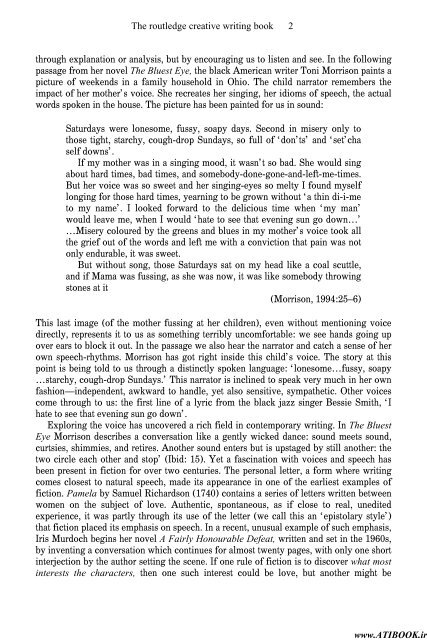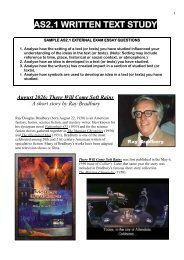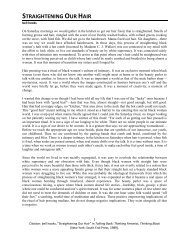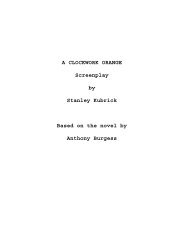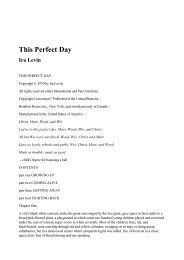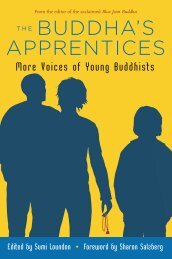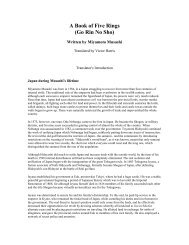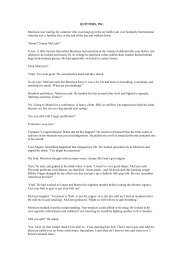9780415317856_the_routledge_creative_writing_coursebook
9780415317856_the_routledge_creative_writing_coursebook
9780415317856_the_routledge_creative_writing_coursebook
Create successful ePaper yourself
Turn your PDF publications into a flip-book with our unique Google optimized e-Paper software.
www.ATIBOOK.irThe <strong>routledge</strong> <strong>creative</strong> <strong>writing</strong> book 2through explanation or analysis, but by encouraging us to listen and see. In <strong>the</strong> followingpassage from her novel The Bluest Eye, <strong>the</strong> black American writer Toni Morrison paints apicture of weekends in a family household in Ohio. The child narrator remembers <strong>the</strong>impact of her mo<strong>the</strong>r’s voice. She recreates her singing, her idioms of speech, <strong>the</strong> actualwords spoken in <strong>the</strong> house. The picture has been painted for us in sound:Saturdays were lonesome, fussy, soapy days. Second in misery only tothose tight, starchy, cough-drop Sundays, so full of ‘don’ts’ and ‘set’chaself downs’.If my mo<strong>the</strong>r was in a singing mood, it wasn’t so bad. She would singabout hard times, bad times, and somebody-done-gone-and-left-me-times.But her voice was so sweet and her singing-eyes so melty I found myselflonging for those hard times, yearning to be grown without ‘a thin di-i-meto my name’. I looked forward to <strong>the</strong> delicious time when ‘my man’would leave me, when I would ‘hate to see that evening sun go down…’…Misery coloured by <strong>the</strong> greens and blues in my mo<strong>the</strong>r’s voice took all<strong>the</strong> grief out of <strong>the</strong> words and left me with a conviction that pain was notonly endurable, it was sweet.But without song, those Saturdays sat on my head like a coal scuttle,and if Mama was fussing, as she was now, it was like somebody throwingstones at it(Morrison, 1994:25–6)This last image (of <strong>the</strong> mo<strong>the</strong>r fussing at her children), even without mentioning voicedirectly, represents it to us as something terribly uncomfortable: we see hands going upover ears to block it out. In <strong>the</strong> passage we also hear <strong>the</strong> narrator and catch a sense of herown speech-rhythms. Morrison has got right inside this child’s voice. The story at thispoint is being told to us through a distinctly spoken language: ‘lonesome…fussy, soapy…starchy, cough-drop Sundays.’ This narrator is inclined to speak very much in her ownfashion—independent, awkward to handle, yet also sensitive, sympa<strong>the</strong>tic. O<strong>the</strong>r voicescome through to us: <strong>the</strong> first line of a lyric from <strong>the</strong> black jazz singer Bessie Smith, ‘Ihate to see that evening sun go down’.Exploring <strong>the</strong> voice has uncovered a rich field in contemporary <strong>writing</strong>. In The BluestEye Morrison describes a conversation like a gently wicked dance: sound meets sound,curtsies, shimmies, and retires. Ano<strong>the</strong>r sound enters but is upstaged by still ano<strong>the</strong>r: <strong>the</strong>two circle each o<strong>the</strong>r and stop’ (Ibid: 15). Yet a fascination with voices and speech hasbeen present in fiction for over two centuries. The personal letter, a form where <strong>writing</strong>comes closest to natural speech, made its appearance in one of <strong>the</strong> earliest examples offiction. Pamela by Samuel Richardson (1740) contains a series of letters written betweenwomen on <strong>the</strong> subject of love. Au<strong>the</strong>ntic, spontaneous, as if close to real, uneditedexperience, it was partly through its use of <strong>the</strong> letter (we call this an ‘epistolary style’)that fiction placed its emphasis on speech. In a recent, unusual example of such emphasis,Iris Murdoch begins her novel A Fairly Honourable Defeat, written and set in <strong>the</strong> 1960s,by inventing a conversation which continues for almost twenty pages, with only one shortinterjection by <strong>the</strong> author setting <strong>the</strong> scene. If one rule of fiction is to discover what mostinterests <strong>the</strong> characters, <strong>the</strong>n one such interest could be love, but ano<strong>the</strong>r might be


